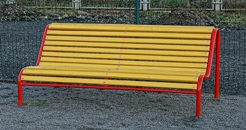 The friendship bench
The friendship bench
From an article by the BBC
Rachel Nuwer from the BBC recently wrote about how Zimbabwe, with only 12 psychiatrists in the country, has been pioneering a groundbreaking mental health programme with stunning results. It uses public benches and a team of grandmothers to tackle depression.
Dixon Chibanda, Director of the African Mental Health Research Initiative and an associate professor of psychiatry at the University of Zimbabwe and the London School of Hygiene and Tropical Medicine, is one of just 12 psychiatrists practising in Zimbabwe – a country of over 16 million and several generations, each with its own experience of psychological trauma.
In brainstorming how to tackle this problem, he arrived at an unlikely solution: grandmothers. Since 2006, Chibanda and his team have trained over 400 of the grandmothers in evidence-based talk therapy, which they deliver for free in more than 70 communities in Zimbabwe. In 2017 alone, the Friendship Bench, as the programme is called, helped over 30,000 people there. The method has been empirically vetted and have been expanded to countries beyond, including the US.
The programme, Chibanda believes, can serve as a blueprint for any community, city or country interested in bringing affordable, accessible and highly effective mental health services to its residents. As Chibanda puts it: “Imagine if we could create a global network of grandmothers in every major city in the world.”
When originally looking at the issue, Chibanda's supervisors told him that there were no resources they could give him. All of the nurses were too busy with HIV-related issues and maternal and child health care, and all the rooms at the local clinic were full. They could, however, give him 14 grandmothers and provide access to the space outside.
Rather than throw up his hands, though, Chibanda came up with the idea for the friendship bench. The grandmothers, who were community volunteers, had no experience in mental health counselling and most had minimal education. “I was sceptical about using old women,” he admits. Nor was he the only one with misgivings. “A lot of people thought it was a ridiculous idea,” he says. “My colleagues told me, ‘This is nonsense.’”
Lacking any other option, though, Chibanda began training the grandmothers as best he could. At first, he tried to adhere to the medical terminology developed in the West, using words like “depression” and “suicidal ideation”. But the grandmothers told him this wouldn’t work. In order to reach people, they insisted, they needed to communicate through culturally rooted concepts that people can identify with. They needed, in other words, to speak the language of their patients. So in addition to the formal training the received, they worked together to incorporate Shona concepts of opening up the mind, and uplifting and strengthening the spirit.
“The training package itself is rooted in evidence-based therapy, but it’s also equally rooted in indigenous concepts,” Chibanda says. “I think that’s largely one of the reasons it’s been successful, because it’s really managed to bring together these different pieces using local knowledge and wisdom.”
Grandmother Rudo Chinhoyi, who is 72, has been with the Friendship Bench programme from the start. “I joined this programme because I wanted to help people in the community,” she says. “It was too much – the depressed people. There were so many of them and I wanted to reduce the numbers.”
She has lost count of the number of people she has treated on an almost daily basis over the past 10-plus years. She regularly meets with HIV-positive individuals, drug addicts, people suffering from poverty and hunger, unhappy married couples, lonely older people and pregnant, unmarried young women. Regardless of their background or circumstances, she begins her sessions the same way: “I introduce myself and I say, ‘What is your problem? Tell me everything, and let me help you with my words.’”
After hearing the individual’s story, Chinhoyi guides her patient until he or she arrives at a solution on their own. Then, until their issue is completely resolved, she follows up with the person every few days to make sure they are sticking to the plan.
Having come from the same communities as their patients, Chinhoyi and the other grandmothers have often lived through the same social traumas. Yet Chibanda and his colleagues have been shocked to find that the grandmothers themselves present surprisingly low rates of post-traumatic stress disorder and other common mental health ailments. “What we see in them is this amazing resilience in the face of adversity,” he says.
Nor do the grandmothers seem to get burnt out despite counselling people on the brink of crisis day after day. “We’re exploring why this is, but what seems to be emerging is this concept of altruism, in which the grandmothers really feel that they get something out of actually making a difference in the lives of others,” Chibanda says. “It gives them a lot of great benefits, too.”
In 2016, Chibanda – collaborating with colleagues from Zimbabwe and the UK – published the results of a randomised control trial of the programme’s efficacy in the Journal of the American Medical Association. They found that after six months, a group that had seen the grandmothers had significantly lower symptoms of depression compared to a group that underwent conventional treatment.
The programme has also expanded to several countries, and in doing so, Chibanda and his colleagues have found not only that it translates well across cultures but also that grandmothers aren’t the only ones capable of giving effective counseling. In Malawi, the Friendship Bench uses elderly counsellors of both genders, while Zanzibar uses younger men and women. New York City’s counsellors are the most diverse, including individuals of all ages and races, some of whom come from the LGBTQ community.
Read the full article here.
See also The Friendly Bench - a Leicestershire based social enterprise.
Retweet about this article:
From an article by the BBC, 20/11/2018